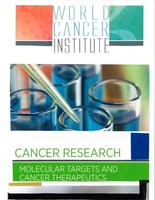SAN FRANCISCO, Aug. 4, 2021 /PRNewswire/ -- Nathan Sassover, Founder / CEO of World Cancer Institute Inc. today announced "further clinical developments in enlarging our targeted medical objectives which originated in 2008 and have evolved to a multiplicity of protocols which continue to be implemented and assessed based on their engagement of processes and molecular/cellular modalities with confirmed levels of disease intervention and containment."
Clearly, biomedical innovation is accelerating at high velocity, and is the result of continued development of multiple modes of precision medicine fueled by the genomic revolution.
Sassover continued: "The solid tumor and hematologic micro environments are increasingly treatment resistant and DNA mediation is essential to reactivate and restore epigenetic equilibrium to yield favorable gene expression in the epigenomic realm."
But despite the many advances made in oncology, cancer remains the number one cause of death in the United States among those 80 years of age and younger, and the second leading cause of death worldwide.
In the U.S., we are losing 1,700 people per day across all age groups to Cancer and these numbers are unfathomable in the context of rapidly ever evolving medical discoveries across the landscape of diverse innovation in Health Sciences.
Nathan Sassover continues: "World Cancer Institute has viewed the disconnect in continuing global medical discovery within the parallel universe of globally escalating human cancer in all sectors of the population, accompanied by stratospheric acceleration of cancer treatment costs, paradoxically conjoined with a continuing rise in Cancer mortality. Daily reports trumpet the cost of new cancer drugs that even physicians are now objecting to ...even when they were involved in their development."
Effectively addressing the challenge of cancer is a race against time. Most cancers go undetected until too late because there is no early screening available today for the majority of deadly cancers. We know that the earlier cancer is caught, the better chance of a cure or a successful treatment. But cancer is chaotically evasive and often spreads and grows before any symptoms arise, meaning that many cancers go undetected until they have progressed to far more formidable later stages.
Statistically, survival drops significantly at these later stages, making early detection critical in efforts to make a major clinical and economic impact against cancer.
As a specific illustration, people diagnosed with lung cancer when the tumor is still localized to the lungs have a 56 percent chance of surviving five years. Once the cancer has spread to other areas in the body, that number falls drastically to only 5 percent.
Today, U.S. guideline-recommended screening only exists for four types of cancer, leaving many deadly cancer types undetected until it's often too late for effective treatment. Further, those screening options often face challenges in uptake due to issues of risks related to invasiveness inconvenience, cost, and difficult access.
As a continuing example less than 5 percent of those recommended for lung cancer screening actually get screened, and many of these cancers detected occur in people who aren't recommended for screening in the first place. Within these contradictory scenarios there have also been concerns that guidelines for recommended screening may lead to the overdiagnosis and overtreatment of cancers that may be slow growing, ones that if went undetected wouldn't cause serious harm or life altering consequences.
We are at an unprecedented time, when the genomic revolution is driving insights into cancer biology and therapeutic decisions and outcomes.
So, a great challenge for bringing these transformational advancements to patient care is driven by a need for realistic assessments of time and resources to create safe and meaningful outcomes within the conjoined focus of World Cancer Institute's framework of Onco ImmunoBiology and Therapeutics.
World Cancer Institute has from inception placed primary emphasis on the hallmarks of incipient early stage molecular/cellular aberrations -the core genesis of Cancer defined within the convergence of DNA Methylation disorders and Histone Regulation anomalies which we view as the systemic debut of all types of cancer pathology in its most prescient yet subtle form of gene expression and corresponding gene suppression.
Continued progress is evident in Cancer methylation-based diagnostics technology which analyzes DNA methylation patterns from the informative regions of the genome not only to detect the presence of a cancer signal, but also identify the 'geography' of where the cancer is located in the body.
World Cancer Institute views the landscape of clinical challenges and the elusive and pernicious mechanisms characteristic of cancer within the 6 most common solid tumors and 4 hematologic cancers present manifold opportunities to manifest a global unity in the diagnostic and therapeutic realm...but also a more globally deliberate commitment to early detection and proactive prevention.
SOURCE World Cancer Institute Inc.

WANT YOUR COMPANY'S NEWS FEATURED ON PRNEWSWIRE.COM?
Newsrooms &
Influencers
Digital Media
Outlets
Journalists
Opted In

Share this article